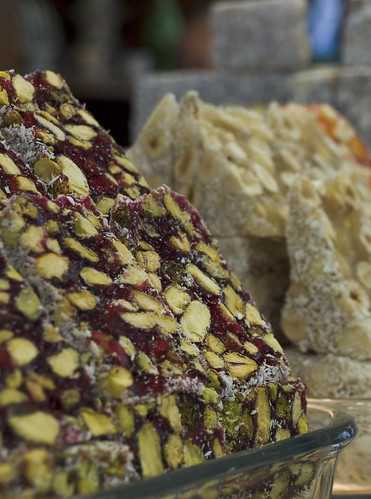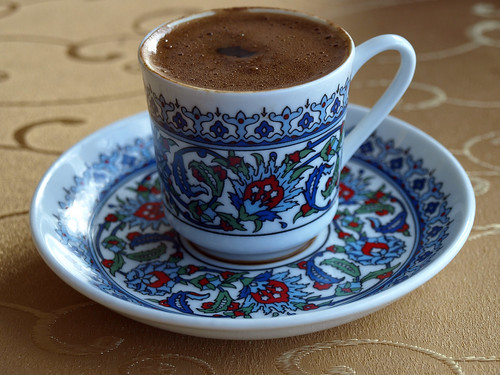There is great wisdom in bringing some Istanbul food disguised as edible souvenirs instead random colorful beauties you will find in the tourist shops and here is why:
- Your gift will be authentic and locally produced: While you may think that global labor sourcing is a purely Western phenomenon Turkish carpet sellers have been proving you wrong by getting some of their “antique” kilims shipped from China factories. Not to mention all the colorful “ethnic” junk that is surprisingly similar in most tourist destinations around the world.
- Your gift will be truly enjoyed and used for its purpose: You remember how you wondered what to do with yet another souvenir your friends got for you from their last vacation? Your gift strategy will not leave people clueless – they will eat what you have brought and will and truly enjoy it.
- You will have great fun shopping for your gifts: I encourage you to shop for food in Istanbul at the places where the locals do. This does not include the airport duty-free (locals get branded perfume not food from there). Head out to a local market or even to a family-run neighborhood grocery and seize this fantastic opportunity to experience the city as a local.
- You can keep the gift to yourself: And finally, what can be better than savoring the memories from your marvelous stay in Istanbul as you indulge the smell or taste of he food wonders you have brought home? I know you wish those things lasted longer. What to do – book your next trip to Istanbul and come for more!
So let me share my tips on top 5 of the Istanbul food items you should definitely take home – for yourself or as a wonderful edible souvenir.
Edible Istanbul Souvenir No.1: Spices
Spices are the backbone of the Turkish cooking: their variety may be not as mind-blowing as in the South Asia or Middle East yet no single Turkish dish is made without throwing in a flavorful pinch in it. Many spices you will find at the local markets of Istanbul are grown in the country – red flake pepper (pul biber), Urfa pepper (isot), oregano (kekik), mint (nane), cumin (kumion), or sumac (sumak). Turkish saffron (safran) grown in the Northern Anatolia is not as valuable as the Iranian one and is best use for medicinal purposes.
If you are going to do some spice shopping in Istanbul but not sure about what to buy you may want to educate yourself little bit: as you dine during your trip to Istanbul ask what spices give the flavor to the dishes you are eating. By the time you get down to the shopping you will have a list. Spices are best bought from the specialty shops that sell them loose. I personally have a prejudice against the pre-packaged stripes featuring up to a dozen of spices – they may look like a good present but I doubt their freshness. 100g of any spice should be enough to keep you going for quite a long while.
Edible Istanbul Souvenir No.2: Dried Fruits and Nuts
Turkey is the world’s largest producer of hazelnut (or “the miracle nut”, as it is labeled in the trade promotion of this Turkish crop) and among the world’s leaders in the production of dried figs, apricots and raisins. The quantity definitely translates into quality here. I don’t think many people can indifferently pass a shop with the sacks of dried fruits and nuts to the cries of the salesmen encouraging to sample them. Golden raisins and sun-dried black apricots, dried mulberry and hazelnuts, dried plums and çerez, a snack of mixed nuts served with apéritifs in Turkey. You really can got nuts while choosing between the shelled (kabuklu) or peeled, salted (tuzlu) or plain, roasted (kavrulmuş) or fresh, grounded (toz), flaked (file) or whole.
When you buy nuts in Istanbul you need to pay attention to their smell and taste: in time the oil in nuts gets rancid and you want to make sure that they do not smell oil that has gone off or taste bitter. You want to be particularly careful when you buy peeled walnuts or any roasted or ground nuts as those tend to go rancid faster. Trust your taste buds rather than a pushy salesman – you don’t need to have a very sensitive palate to tell the rancid taste.
Edible Istanbul Souvenir No.3: Turkish Delight

These sugar-dusted cubes of thickened milk or fruit syrup often made with dry nuts are also called lokum. The treat has been know since the Ottoman times when it was eaten for digestion after meals. Of all the Turkish sweets this one is the easiest to carry and store (keeps up to three months) – that’s why it has become such a hit among the tourists coming to Istanbul. Everybody seems to be making and selling it – you will see a wealth of varieties of Turkish delight made of grape syrup (pekmez), milk, with walnuts or pistachio added, flavored with rose water, mint, fruits or spices.
Once you are in Istanbul it will be a shame to get a pack of mix Turkish delight at a supermarket or at the airport duty-free. Make some time to stroll down to a good specialty shop for the freshest lokum made according to the recipes that have kept Istanbulites happy for decades.
Edible Istanbul Souvenir No.4: Cheese
If you have been lucky to have a proper breakfast at your hotel or even more luck has poured on you and you have got a chance to breakfast at a Turkish home you will know that Turkey has something to brag about when it comes to cheeses. Besides the white cheese (beyaz peynir) that is a staple for Turkish breakfast and a king of starters served with melon for your dinner with rakı there is a whole bunch of tastes, shapes, colors and textures – yellow blocks of kaşar peyniri, light-yellow fumed çerkez peyneri, crumbly lor peyniri (curd cheese) or white fibers of tel peyniri (wire cheese). For better or worse, Turks do not seem to care as much as French or Italians about marketing their cheeses outside the country. That’s why if you have fallen for some of Turkish cheeses during your stay in Istanbul (or just willing to take my word for it) you need to get some cheese shopping done.
Look, smell and try. What may seem as plain vanilla (white cheese) actually comes in different flavors – as I personally like creamier texture I make sure not to get drier and slightly bitter varieties. Watch out for molds and oily spots on the cheese- as most of the Turkish cheese is either fresh or soft presence of molds on the surface means that the cheese is off – quite unlike to the hard varieties as with them you can just cut off the molds and still eat the rest.
Edible Istanbul Souvenir No.4: Turkish Coffee

Black as hell, strong as death, and sweet as love – this way Turks affectionately refer to the coffee they prepare. Traditional Turkish coffee is distinctive from other types in many ways: thick foam it is served with keeps it warm so you can enjoy it more, its velvet texture stays on the palate longer bringing a good rounding to a good meal and the grounds remaining in the cup are very handy when it comes to fortune telling. Not everyone falls for this traditional Turkish drink but if you do and would love to ship some home there are a few things you need to know before buying.
Turkish coffee refers to the particular grind, way of preparation and serving. Arabica beans mostly from Brazil are used to make Turkish coffee; they get roasted and then grounded into very fine powder, much finer than for espresso. Turkish coffee is prepared in cezve, a Turkish coffeepot, by mixing coffee with water, desired amount of sugar and then bringing the mixture to boil as you continuously stir it. Most popular brand of Turkish coffee is Mehmet Efendi, you can get it even in the supermarkets (and the duty free shop at a hefty premium) yet you may get more adventurous with looking out for more small-scale Turkish coffee vendors who do their own roasting in the shops scattered around key markets in Istanbul. Or find out more on the right places to shop and best ways to do so in Istanbul in my post about Istanbul Spice Market.
- See more at: http://www.deliciousistanbul.com/blog/2011/02/07/istanbul-food-shopping-tips/#sthash.5d4WjBUR.dpuf




Dried fruits are healthy for health and great food to eat in winter. I like your dried fruits quality.
YanıtlaSilThanks for this information.